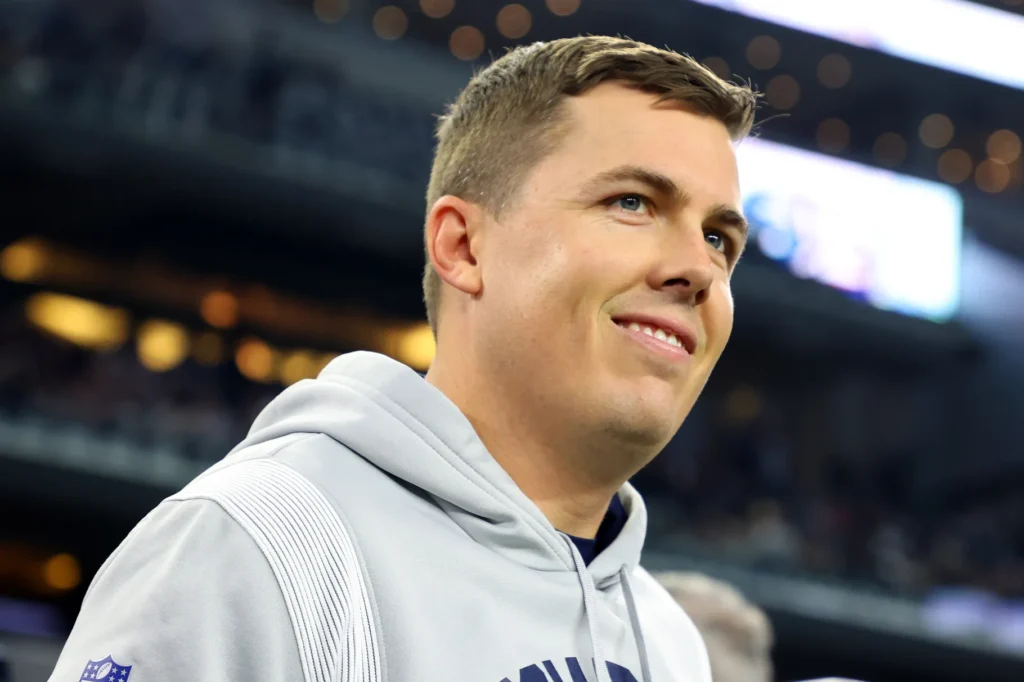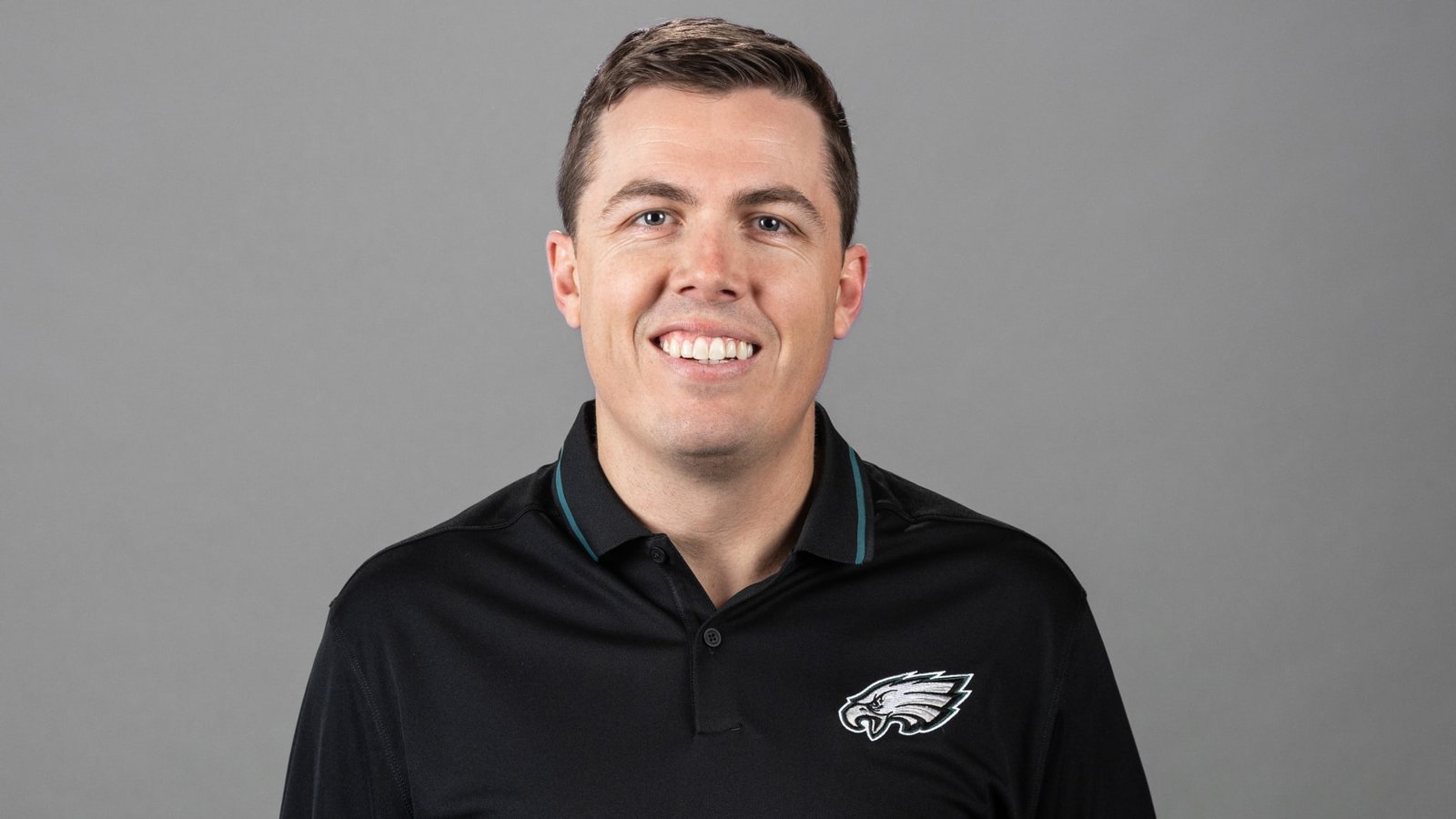In the world of American football, few figures have experienced as swift and impactful a rise as Kellen Moor. From his days as a star quarterback at Boise State to his emergence as one of the most promising young offensive minds in the NFL, Moore’s journey has been characterized by his deep understanding of the game, his innovative approach to offensive schemes, and his unyielding commitment to excellence. This blog explores Moore’s career path, his influence on the teams he has coached, and what the future may hold for him as he continues to shape the landscape of professional football.
Early Years and College Success at Boise State

Kellen Moore’s football career began long before he stepped onto a college field. Born in 1988 in Prosser, Washington, Moore was introduced to the game at a young age by his father, Tom Moore, who was the head coach at Prosser High School. His upbringing in a football-centric family allowed him to develop a cerebral understanding of the game that would set him apart from his peers.
Moore’s high school career was nothing short of spectacular. He was a standout quarterback, setting multiple school records and attracting attention from college programs around the country. Despite his impressive stats and football IQ, many major programs overlooked him due to his size and perceived lack of athleticism. However, Boise State saw the potential in Moore and offered him a scholarship, which he accepted in 2007.
At Boise State, Moore quickly established himself as one of the best quarterbacks in college football history. As a freshman starter, he led the Broncos to a 12-1 record and showed a poise beyond his years. Over the next four seasons, he accumulated an impressive 50-3 record as a starter—the most wins by any starting quarterback in NCAA history at the time. He also threw for over 14,000 yards and 142 touchdowns, solidifying his legacy as one of the most successful college quarterbacks of all time.
But Moore’s success at Boise State wasn’t just about numbers. It was his leadership, decision-making, and ability to read defenses that truly set him apart. His mastery of Boise State’s complex offensive schemes allowed the Broncos to become one of the most dynamic and unpredictable offenses in college football. Moore’s tenure culminated with a Fiesta Bowl victory in 2010, where Boise State defeated TCU, 17-10, cementing the team’s status as a national powerhouse.
Transition to the NFL: Playing Career and Early Coaching
Despite his college success, Moore went undrafted in the 2012 NFL Draft due to concerns about his size, arm strength, and athleticism. However, he signed with the Detroit Lions as an undrafted free agent and spent three seasons with the team as a backup quarterback. While he saw limited playing time, Moore’s intelligence and understanding of the game caught the attention of coaches and teammates alike. His role became more that of a player-coach, often helping the starting quarterbacks with game preparation and serving as an extra set of eyes on the sideline.
Moore’s playing career continued with a stint at the Dallas Cowboys, where he reunited with former Lions offensive coordinator Scott Linehan. It was in Dallas that Moore got his first real opportunity to start in the NFL. In 2015, injuries to the Cowboys’ starting quarterbacks forced Moore into the starting lineup for two games. While his on-field performance was inconsistent, it was clear that Moore had a future in the NFL—albeit not necessarily as a player.
In 2018, after an injury ended his playing career, the Cowboys offered Moore an opportunity to transition into coaching. He accepted a role as the team’s quarterbacks coach, a move that marked the beginning of his rapid ascent in the coaching ranks.
Ascending the Coaching Ranks: Offensive Coordinator of the Dallas Cowboys
Moore’s impact on the Cowboys was immediate. As quarterbacks coach, he worked closely with Dak Prescott, helping him refine his mechanics and develop a deeper understanding of the offense. Prescott had one of his most productive seasons under Moore’s guidance, leading to Moore’s promotion to offensive coordinator in 2019—a rare feat for someone so young and relatively inexperienced in coaching.
As offensive coordinator, Moore brought a new level of creativity and complexity to the Cowboys’ offense. His schemes emphasized misdirection, pre-snap motion, and diverse route combinations that kept defenses guessing. The Cowboys’ offense flourished under his guidance, ranking first in total yards in 2019. Although the team struggled with injuries and inconsistent play in subsequent seasons, Moore’s play-calling continued to garner praise for its innovation and adaptability.
One of Moore’s standout qualities as a coordinator is his ability to tailor his game plans to the strengths of his personnel. During the 2020 season, when Prescott suffered a season-ending injury, Moore adapted the offense to suit the skill sets of backup quarterbacks Andy Dalton, Ben DiNucci, and Garrett Gilbert. While the team’s overall performance was below expectations, Moore’s ability to keep the offense competitive despite the circumstances was commendable.
In 2021, with a healthy Prescott and a more cohesive offensive line, the Cowboys’ offense returned to form, finishing the regular season ranked first in both total yards and points scored. Moore’s schemes showcased his knack for creating mismatches and exploiting defensive weaknesses. He was particularly effective in using a balanced attack that incorporated both the run and pass games, making the Cowboys one of the most difficult teams to defend against.
Offensive Philosophy: Balancing Innovation with Tradition
Moore’s offensive philosophy is built on a blend of traditional football principles and modern innovations. He values a strong running game and effective play-action passing, but he also incorporates elements from the college spread and air raid offenses, creating a unique hybrid system that allows for flexibility and creativity.
A hallmark of Moore’s offense is his use of pre-snap motion and shifting formations to identify defensive coverages and create mismatches. He also places a heavy emphasis on route combinations that attack different levels of the field, forcing defenses to defend every blade of grass. This approach not only opens up opportunities for big plays but also makes it easier for quarterbacks to find open receivers, leading to higher efficiency in the passing game.
Moore’s play-calling often includes a mix of traditional power runs, quick-hitting passes, and deep shots down the field. This balanced approach keeps defenses on their heels and allows the offense to adjust based on what the defense is showing. He’s also known for his willingness to take calculated risks, whether it’s a trick play or a high-risk, high-reward deep pass on a critical down.
The Move to the Los Angeles Chargers
In early 2023, Kellen Moore made a significant career move by joining the Los Angeles Chargers as their new offensive coordinator. The Chargers, led by star quarterback Justin Herbert, presented an ideal opportunity for Moore to further prove his capabilities as an offensive mastermind. With a talented roster featuring Herbert, wide receiver Keenan Allen, and running back Austin Ekeler, the Chargers’ offense has the potential to become one of the league’s most explosive under Moore’s guidance.
Moore’s move to the Chargers was viewed as mutually beneficial for both parties. For the Chargers, hiring Moore signaled their intent to maximize Herbert’s potential and elevate their offense to a championship-caliber level. For Moore, it represented a fresh start and an opportunity to work with a young, talented quarterback whose skill set aligned perfectly with his offensive philosophy.
The Future: Head Coaching Aspirations and Legacy
Kellen Moore’s rapid rise from college star to NFL offensive coordinator has led to speculation about his future as a head coach. At just 35 years old, he has already established himself as one of the brightest young minds in the league, and it seems only a matter of time before he receives his first head coaching opportunity.
If Moore’s track record is any indication, he is well-prepared for the challenges of being an NFL head coach. His ability to connect with players, adapt his schemes, and consistently produce high-powered offenses makes him a prime candidate for teams looking to revitalize their programs. His experience as both a player and a coach gives him a unique perspective that resonates with players and colleagues alike.
As Moore continues to build his legacy, his journey serves as a testament to the power of perseverance, adaptability, and a deep love for the game. From his days as an overlooked high school quarterback to his current role as one of the most sought-after coordinators in the NFL, Kellen Moore’s story is far from over. Whether he becomes a head coach in the near future or continues to hone his craft as an offensive coordinator, one thing is certain: Kellen Moore’s influence on the game of football will be felt for years to come.


2 thoughts on “The Rise of Kellen Moore: From Quarterback Prodigy to Offensive Coordinator”